
Haunted MTL Original – I Am Your Madeline – Meghan Robins
More Videos
Published
3 years agoon
By
Shane M.
“I Am Your Madeline” by Meghan Robins
Emily awoke with the sun on her face, a sweet muskiness on her sheets and the sound of the zipper closing on Douglas’s gym bag.
“I was hoping not to wake you,” Douglas said, stalled at the bedroom door, debating, Emily knew, whether to say sorry or just leave. His chewed-up thumbnail tapped the white trim of her bedroom door. The famous Douglas Bruce Cunningham, renowned playwright with acclaimed performances topping New York City’s charts for the last two years, never said what he did not mean. To say sorry when he was not might crack his moral code, a painful, irresistible trait that attracted Emily to him in the first place.
“I’ll get her to sign the papers today, I promise,” he said.
It was uncharacteristically dark for Emily to envision stabbing his ex-wife in the throat, his cab crashing, her sending every tabloid in New York pictures of their affair. He could have told her he was married long before last night. Instead she looked at him from his sun-soaked bed and said, “When will I see you?”
Douglas smiled. “I have something for you.” He set an envelope on the bookshelf. “Just until the next paycheck comes.”
Emily nodded. Acting had been a poor choice when her grandmother got sick and their finances turned irreparable. But she was finally getting leading roles, and she had Douglas to thank. In her audition, Douglas had been absolutely right to say, “You’re the only one who could play my Madeline.”
From the window, she could see him awaiting his breakfast burrito at the café downstairs, folding the Times to the crossword section and reaching into his bag for a pen. Emily fingered the air conditioning unit, imagined pulling the plug and tipping it headlong out the window. She wanted to believe in his divorce, but couldn’t understood why it had taken him so long to admit that he was still married.
“She’s difficult,” Douglas had explained said last night. “You don’t know her like I do.”
That’s what all married men say to their mistresses. They were practically writing his next play. A man like Douglas, so cerebral, so brilliant, needed a reminder of why he should come back to her.
Emily picked up her phone. She watched as Douglas sent her to voicemail, his hand in his pocket. In the message she sounded strangely outside of herself. Her voice was hers but she hardly recognized it. It was haunting really—short, sweet, serious—but that’s how Douglas preferred things. As she walked home with two thousand dollars in an envelope shoved in her purse, Emily tried not to feel like she’d just traded money for sex.
In the kitchen, she dropped the envelope on the table.
“We need the money,” she said. Her grandmother raised an eyebrow. The kettle whistled and Emily poured a pot of tea.
“I probably won’t see him again,” she told Grammy, fighting off the cold with another blanket.
“Sit down, dear,” Grammy said. “Drink up. Let’s see what we can do.”
When Emily finished her tea, Grammy swirled the dredges of her cup, hunched over until her nose grazed the lip. She mumbled words from the old language, rocked back and forth. The cold apartment grew warmer, brighter. Grammy’s brows furrowed. Her eyes popped open and she backhanded the tea cup to the floor.
Emily kneeled before her. “What is it?”
Grammy wrapped two frail arms around Emily, fingernails digging in like a declawed cat.
“I’ve done a terrible thing.”
Across town, Douglas had just handed his wife their divorce papers. “I’m serious this time,” he said.
Caroline paced the living room that housed ten years of shared belongings.
“Who is she?”
Douglas swirled his cup. The bag had brewed too long and his green tea was bitter. “That’s not why we’re getting a divorce,” he said.
“Don’t tell me she’s your muse, that your career depends on it. How many muses have you had, Douglas? Five? Ten? Don’t say I’m not the reason your writing career took off in the first place. Caroline, Madeline? You practically named her after me. The entire play is about how we met.”
“But our divorce is—”
Caroline screamed, sweeping her arms across Douglas’s desk, clattering papers, pens, his laptop to the floor.
“I’m sick of your impenetrable reasoning! Your need to be right. Always right. How does a man who only speaks the truth cheat on his wife?”
“I didn’t cheat on you, Caroline. Our marriage was over long before—”
“Before whom. Her? The one before her?”
Douglas picked a pen off the floor. “Just sign the papers.”
Long red-nailed fingers reached forward, and for a moment, their hands touched. Caroline waited for him to feel something.
“The reason—” Douglas started.
“Don’t,” Caroline said, ripping the pen from his hand.
Douglas raised his voice. “The reason for our divorce is…”
Before he could finish, a red and white ballpoint with Marriot written across its side punctured his jugular.
His green tea splashed across the Safavid carpet. The divorce papers clutched in his right hand. As Douglas gurgled on the floor, Caroline stepped over him.
“Not so quickly, my love,” she said and sat him upright, pressing her palm to his throat.
Three days later, the Times reported the elopement of Mr. and Mrs. Douglas Bruce Cunningham, that they were moving back to Bali, that he was retiring from the stage. Heartbreak overtook Emily, but so did her need to pay the bills. Her grandmother was requiring more medical attention, and Emily told her agent she’d take anything. She resorted to T.V. commercials, none of which she was getting. At one audition, a woman recognized her. They’d worked together on The Diner’s Dilemma, Douglas’s breakout play and Emily’s breakout role.
“Did you hear what happened?” The actress said. “I think she killed him. Why else would he leave at the height of his career?”
Warmth plucked at Emily’s spine.
“She was a witch you know. He found her on that island. I heard their divorce papers were never signed, which means she gets everything. Everything. Read it. It’s all in the tabloids.”
Emily did not get the car commercial, even though it was just her foot depressing the clutch and her hand shifting gears. She didn’t get the toothpaste bit or the airline ad. When her agent called with an audition that sounded like a good fit, “They’re looking for Cunningham girls. You’re a shoe-in,” her grandmother nearly threw herself from her chair. When Emily listened to the message again to confirm the date and address, an entire shelf of mugs clattered to the floor
Emily said, “Grammy, stop this.”
Then the garbage disposal turned on.
“Grammy.” Emily walked over and flipped the switch.
“It’s him,” Grammy said. “I called him back.”
The next day the crossword appeared at the kitchen table. On her way to the corner store, a toaster nearly hit Emily from a three-story window. She’d had enough.
“What do you want from me, Douglas?” Emily yelled.
She returned home to find mustard-yellow cursive looping across her kitchen table. The words spelled, “Don’t go.”
Grammy pleaded that she listen to him.
“We need the money,” Emily said and left.
The audition was Tuesday four o’clock. The metal door to the elevator cage clanked shut. When the bellhop tipped the brass lever forward, the elevator rattled down. Emily had expected it to pull up. Two stories underground the cage opened to the orange glow of a backstage. Red curtains were drawn, a slit of yellow emanating beneath them. It sounded like a full house.
The bellhop handed her a paper. Half a dozen actresses stood in a single file line. Many wore long sleeves and skirts, most of them navy blue. Emily didn’t recall suggested costumes but today she wore her usual pleated skirt, an ivory blouse, her teal cardigan embroidered with daisies sprouting from her breast pocket. Her hair, always short, seemed to match the others, and for a fleeting moment she felt the opposite of stand out. Still, it’s fortuitous, she thought, that her norm was in line with whatever character she was vying for. Emily took her place in the queue, tried to read her lines, but eventually tapped the shoulder of the woman in front of her.
“Excuse me. Do you know the line? I can’t seem to read my paper.”
The woman turned and two white orbs popped out of sleep-deprived sockets. Red lightning bolts blasted from each iris. Drugs, Emily thought.
“She’ll tell you,” the actress said. Her voice sounded scabbed, hoarse. One bulbous tear pooled along her red-rimmed eyelid, then dropped to the floor.
Emily looked at the wet splotch. “Thank you,” she said, and the line moved forward.
Another woman burst off stage with hands cupping her head. She rushed toward the elevator, which had already been called up, stopped abruptly, turned, and then cut in line.
“Excuse me,” said Emily, “I—”
The woman lowered her hands. Patches of hair had been ripped from the top of her head. Her sallow cheeks looked so deprived they were nearly bruised. Emily gasped, waved her hand as if gesturing for the last seat on the bus. The woman stepped forward, gripped her paper, yellow and worn, and began mumbling her words over and over.
Sweat was beginning to bend Emily’s own sheet of paper. She was clutching it, wrinkling it. The next woman to exit stage left looked like a porcelain doll before her eyelids were painted on. She marched straight to the elevator, which was not there, and stepped into the open abyss. Moments later, the elevator appeared, rising up from below with her standing inside. The bellhop helped her out and she took her place at the back of the line.
Emily was being sieved to the front, only two actresses away from the curtain. A shrill voice on stage yelled, “Next!” and the woman with patchy hair parted the curtains and stepped through. Moments later she burst backstage, fingernails tearing open her scalp. It was Emily’s turn.
On stage, Emily suddenly felt at ease in the light. Her senses returned to her last star performance in The Diner’s Dilemma. The smells, the sounds, the audience was all there. Just as she remembered it. Even the woman in the front row was so familiar Emily ached with comfort. In fact, that woman’s face, so well framed in flowing brown hair, her lips a deep shade of red, looked more beautiful than all the other nights Emily had performed for her. No longer in her teal cardigan and navy skirt, Emily donned the yellow and blue cocktail dress from The Diner’s Dilemma. This woman, Emily realized, had been there for every single performance. While a Douglas Bruce Cunningham play promised highly sought-after bragging rights among high-brow friends, to see it more than once was excessive.
The red-lipped woman was vivid, stunning. Her rosy cheeks and ruby lips were in direct contrast to the audience around her. Their pallor skin clung to skeletal structures. Hundreds of men and women filled the auditorium, their contorted expressions both a result of being bored to death as well as being, most likely, dead. The woman, hot-blooded and radiant, linked arms with a man beside her. His pointed chin drawn so tight it almost appeared as just bone.
“Tell me darling.” The woman’s voice cut like the wind. “Is that her?”
The man, hardly a man, a skeleton being kept alive by a shoestring, raised himself to look at Emily.
Emily toed the seam of the floorboards. She was becoming the waitress of the play again, her tight apron snug and un-utilitarian across her thighs. The lines she’d recited for nearly two years, the lines written by the once famous Douglas Bruce Cunningham, came back to her like a song. They burst out of her with the familiar fervor Douglas had always encouraged in her. For no reason at all she started in the middle of act two, the scene where her character realizes she’s in love with her customer.
“Stop!” the woman shrieked. “Read your line.”
“But the page is blank.”
“Read it.”
Words began to appear on the crumpled paper, first in gray, then black. Emily faltered in her yellow heels.
“Read it,” the woman said.
Emily could not. Would not. The woman, her dress. The dress Douglas had once pointed to in a shop window and asked if Emily liked it. The dress Emily said was too formal a gift for someone he’d been dating only two months. The dress she saw later that week on a woman in the audience and thought, there, there’s a woman whose husband loves her… That dress.
The man whose chin stuck out like bone, whose cowed look was suddenly so familiar Emily could feel his hands caressing her cheek and the sunlight raising musk from her bed.
“Read it,” the woman said again, and Emily did as she was told.
As each word formed in her diaphragm, passing up her esophagus and through her lips, she felt their reverberations tear through her innards. As if the letters were forming inside her, their sharp corners ripping like shards in her voice box.
“Again,” the woman said. Every time Emily repeated her line, her intestines tore until she was coughing bits of blood.
“Again.”
Emily spit part of her stomach lining onto the hardwood.
“Again.”
Finally, her voice was so raw, her mouth so full of iron, she practically gargled it out: “I am your Madeline.”
Exhausted, bruised, Emily stood her ground, feeble but standing.
The woman looked at the man beside her. “Douglas, dear, is that the woman who tore our life apart? Is she the reason you divorced me?”
The man glanced at the carnage on stage, turned the question over in his mind. Emily pleaded. She was not the reason, but she was the cause. One of many, it seemed. Yet why had this woman, this stupid woman, phrased it just so? No wonder he’d divorced her. In the six months of their affair, Emily had learned to be more careful with her word choice. Say precisely what you mean. But this woman knew that, didn’t she.
She asked again, “Dear husband. Is she the reason you divorced me?”
Douglas, dead or dying and morally tortured, shook his head no.
His wife smirked. Guffawed. “I heard the message on his phone, darling. Perhaps if you say it exactly as you did then, he’ll remember you. All I want is to hear him say it. To say he cheated on me, but he doesn’t seem to recall. Convince him of that and you will all be released. Next time, dear, say it better.”
Emily gripped her blood-stained paper and exited stage left. Behind the curtains a half dozen listless faces looked at her, pleading. Then the screech from front stage called the next woman forward. The mumble of actresses continued. Emily stepped to the back of the line.

Meghan Robins lives in Bend, Oregon, where she spends her time writing, running, and circumambulating mountains with her partner and friends. Her work has appeared in VocieCatcher, Powder Magazine, The Kokanee Review, and the short story collection Tahoe Blues. She is currently working on a historical novel set in a logging camp in Lake Tahoe in 1860.
You may like
1 Comment
Leave a Reply
Cancel reply
Leave a Reply
This site uses Akismet to reduce spam. Learn how your comment data is processed.
Original Creations
Peeping Toms Comic Book Collage Crystal Art by Jennifer Weigel
Published
5 days agoon
July 21, 2024
So I happened upon this very cheesecake-heavy premiere issue of Extremes of Violet, complete with pinups by some of the comic book greats of the time, and decided to make some Peeping Toms collage art by incorporating the voluptuous vixen into various crystal pieces to create a sort of fishbowl effect centered largely on her bosom (which is unavoidable).
Each of the Peeping Toms is shown from three angles because of how much the pieces shift as the light plays off the crystal. I started with these star forms.
The second bowl was even a bit iridescent, and violet at that!
Next I did a series of really perky busty bowls, which really get the feeling across that you are looking through the tiny peephole in a door as well as exemplifying the content even more. Note: these are shown in two rows with side details as well, so there are a lot of pics here…
I experimented a little and tried a couple of other scenes, like the portrait, as well. She’s staring back at the Peeping Toms…
I also tried this more square bowl form.
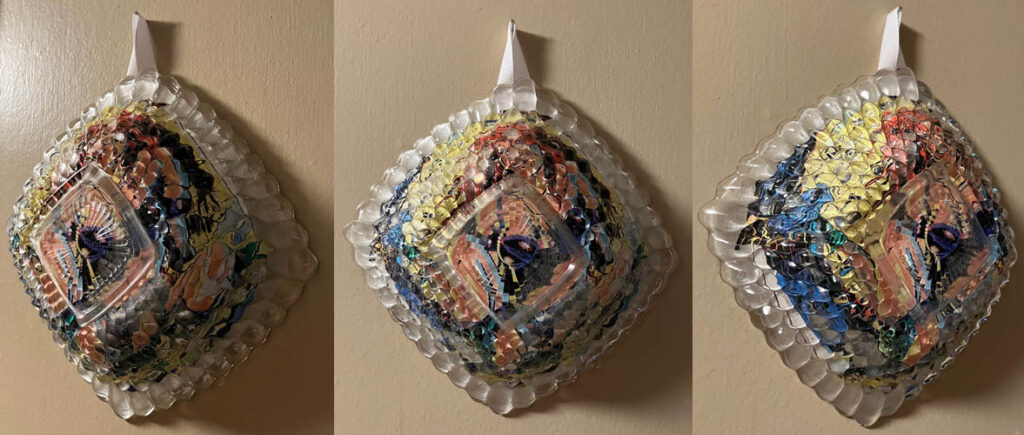
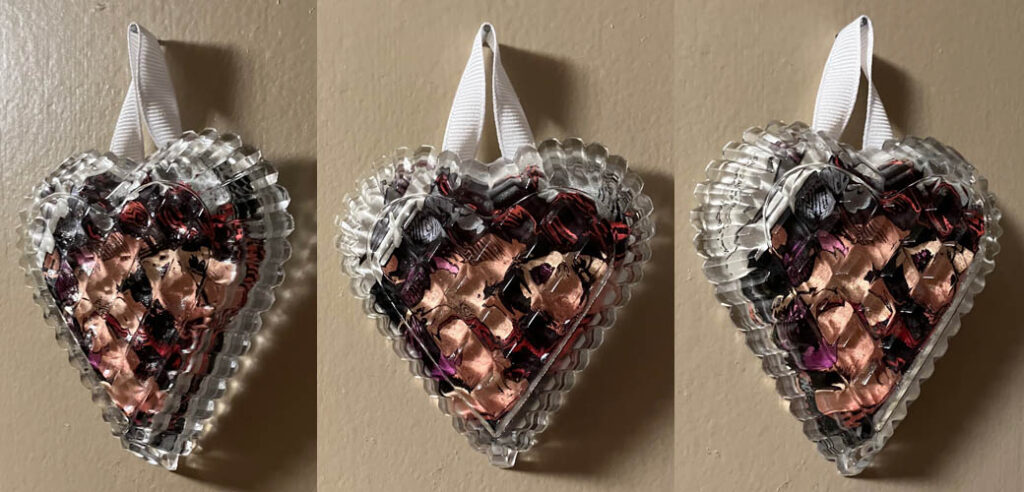
And finally, I found this little heart, which is my personal favorite of the group.
These works are a continuation of my Creepy Comics collage series, shown on Haunted MTL here.
Creepy Comics 5
Feel free to check out more of Jennifer Weigel’s work here on Haunted MTL or on her writing, fine art, and conceptual projects websites.
Original Creations
Zombie Christ – Second Coming Art by Jennifer Weigel
Published
2 weeks agoon
July 14, 2024
So I probably should have taken a before picture, but I found a faux wood stained plaster Jesus statue and turned it into Zombie Christ. Because it’s the second second coming. Or something. It’s kind of an offshoot of my nail polish paintings reappropriating thrift store art…
Anyway without further ado, I present…
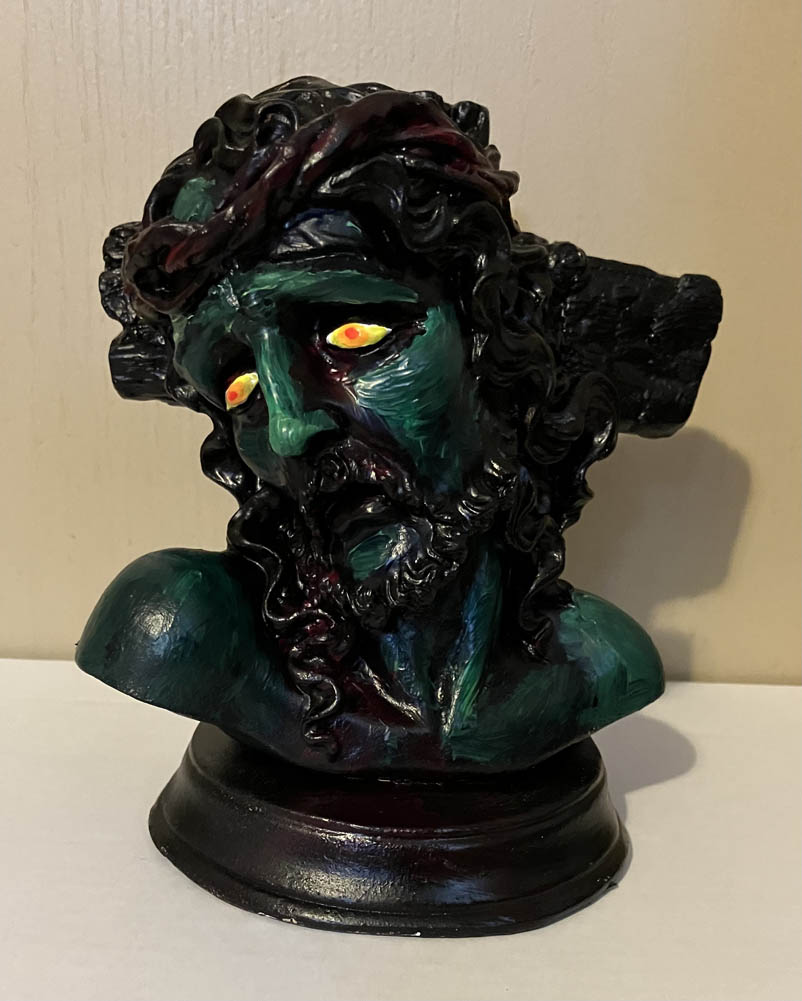
I was a little concerned that I made him too green at first, but I’m happy with the finished result. This statue just looked so anguished. It’s eyes had been closed but I like them better open and even painted them with blacklight reactive nail polish so they will stand out even more and be interactive in other ways to add creepy factor.
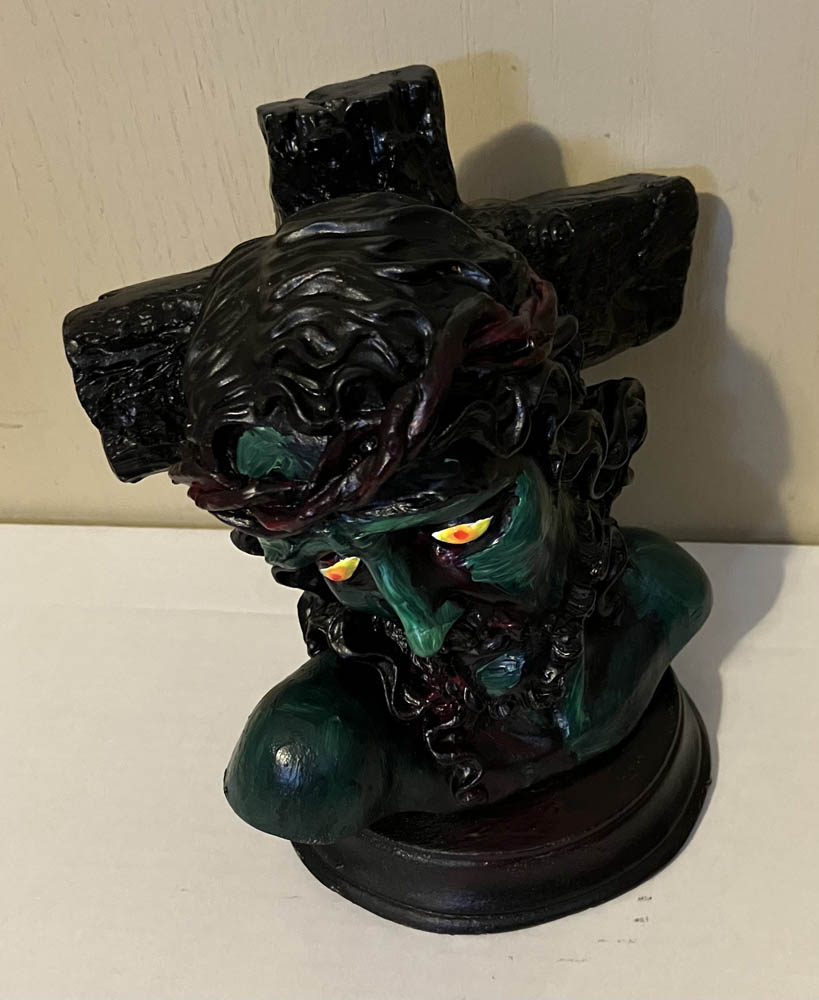
Sadly I don’t have a blacklight anymore or I’d share a picture that way too. Oh well. I’ll leave you with a fun detail shot instead.
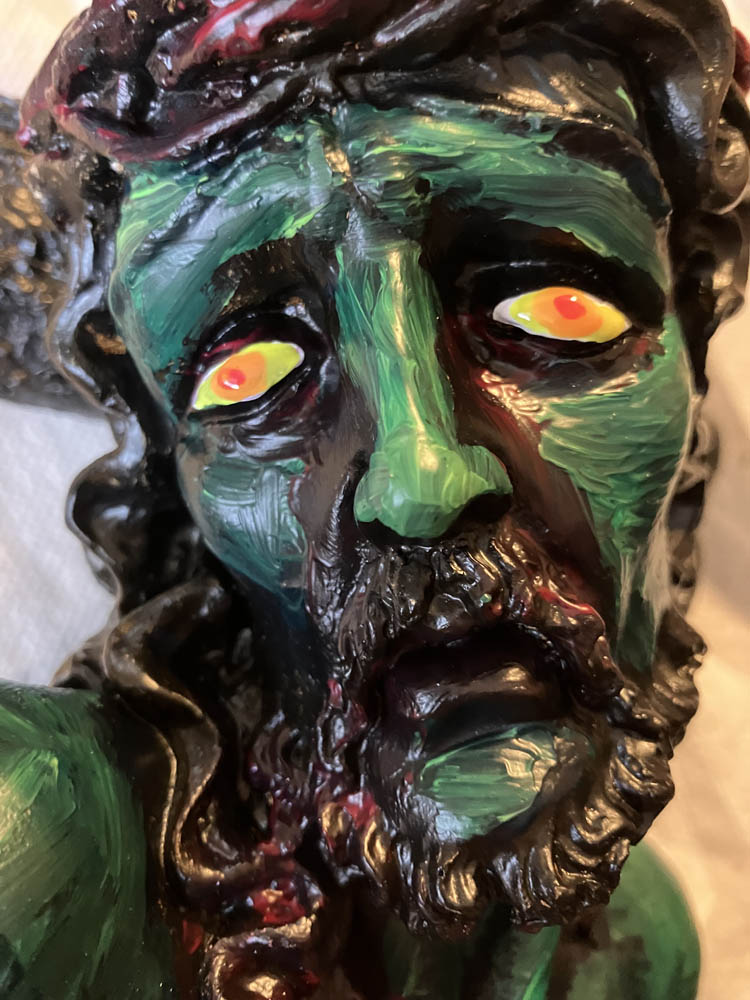
Next time I may make him more gray than green though. We shall see…
Feel free to check out more of Jennifer Weigel’s work here on Haunted MTL or on her writing, fine art, and conceptual projects websites.
Original Creations
Jennifer Weigel Art Collection Highlights Part 3
Published
3 weeks agoon
July 7, 2024
So it’s been awhile since we’ve looked at some of the things I have gathered, so I thought I’d bring back my art collection for another round… Here are the first and second highlights in case you missed earlier explorations.
From left to right: M Pena Windstone Editions bat-winged flap cat, bone mask by Terry and Susan Wright, wood cat in skull by labcreature, real hair art by myself, pencil drawing of Barbarois Elder for Vampire Hunter D anime cel
From left to right: Barbarois Elder for Vampire Hunter D anime cel, Turn Me Royal portrait of my father and stepmother as Frankenstein’s monster and his bride, painted horse skull
Left to right: Overgrowth by Ellie Bradley, heart by TenderFlesh, praying devil girl by Torman’s Treasures
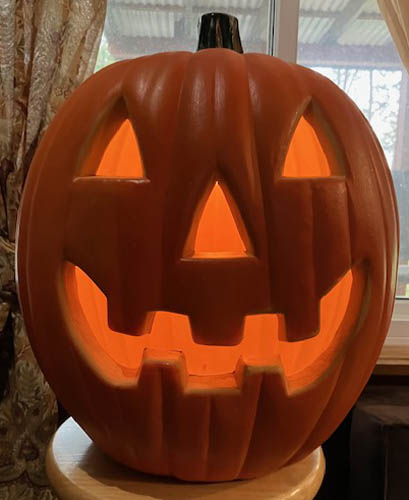
And a vintage plastic 2-foot Jack O Lantern I got at a yard sale and have kept on display on his very own stool in the living room since. So happy.
Anyway, there are some more highlights from my art collection, as it is always growing and evolving. I have lucked into several of these pieces at antique and thrift stores or acquired them from the artists or more. And yes, I still have Da Ting the taxidermy shih-tzu from the first of these posts.


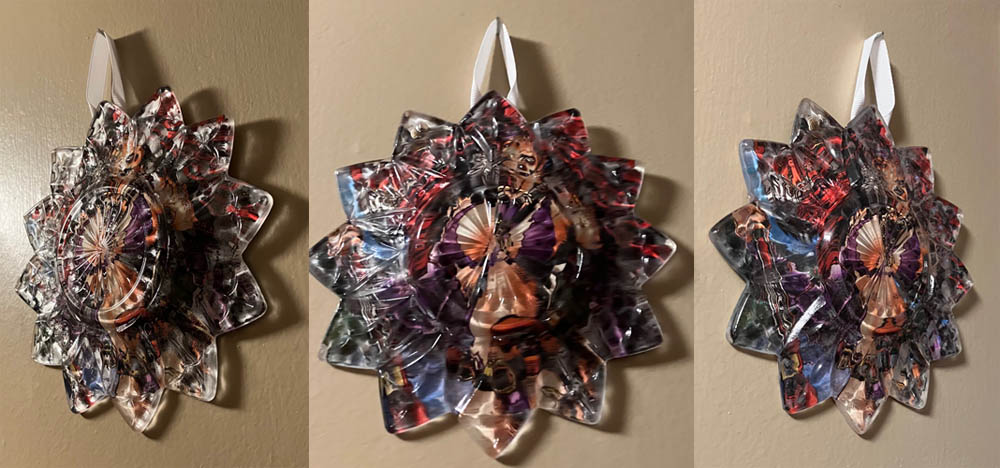
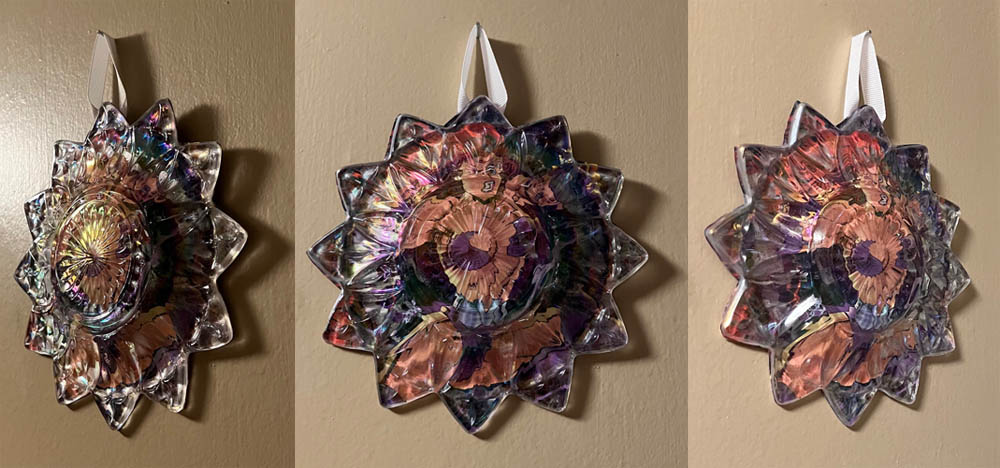
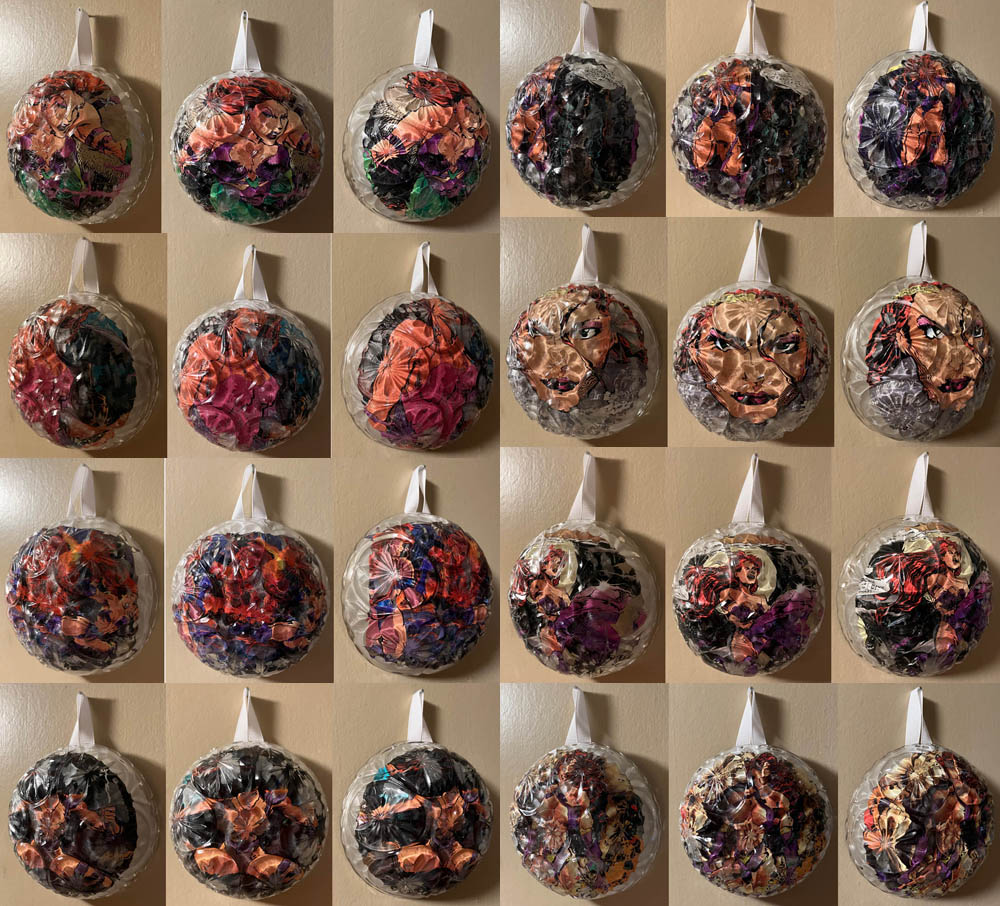
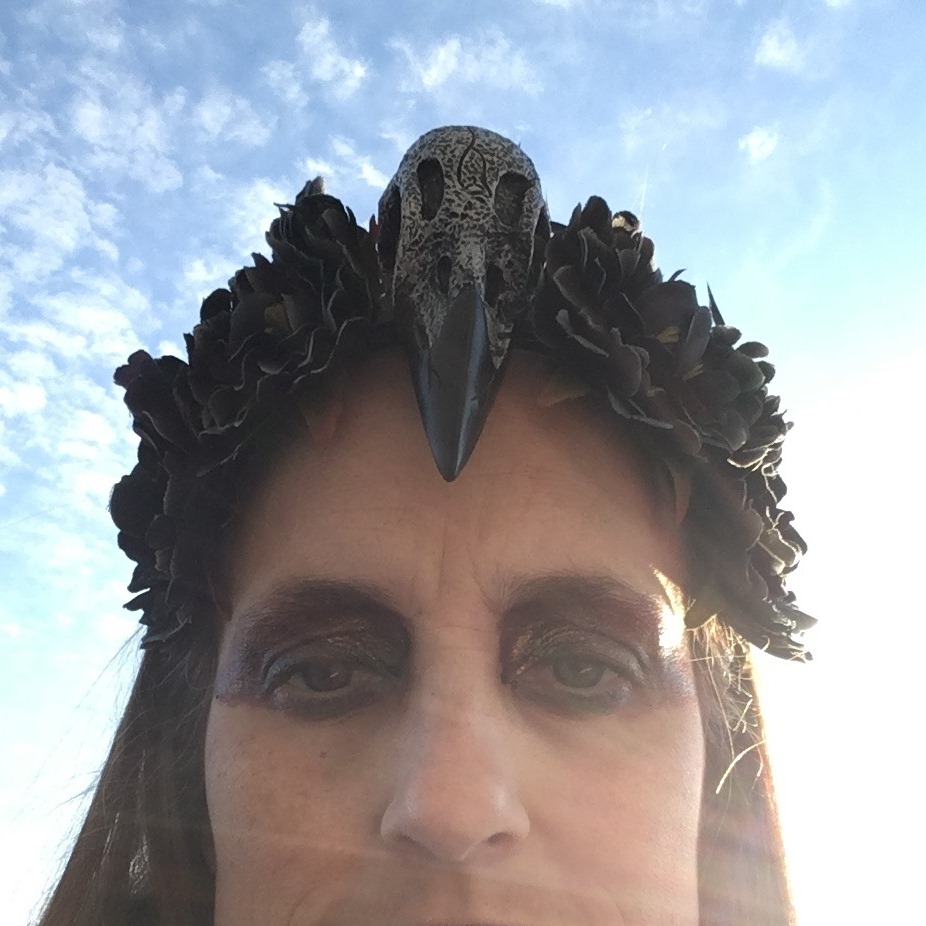
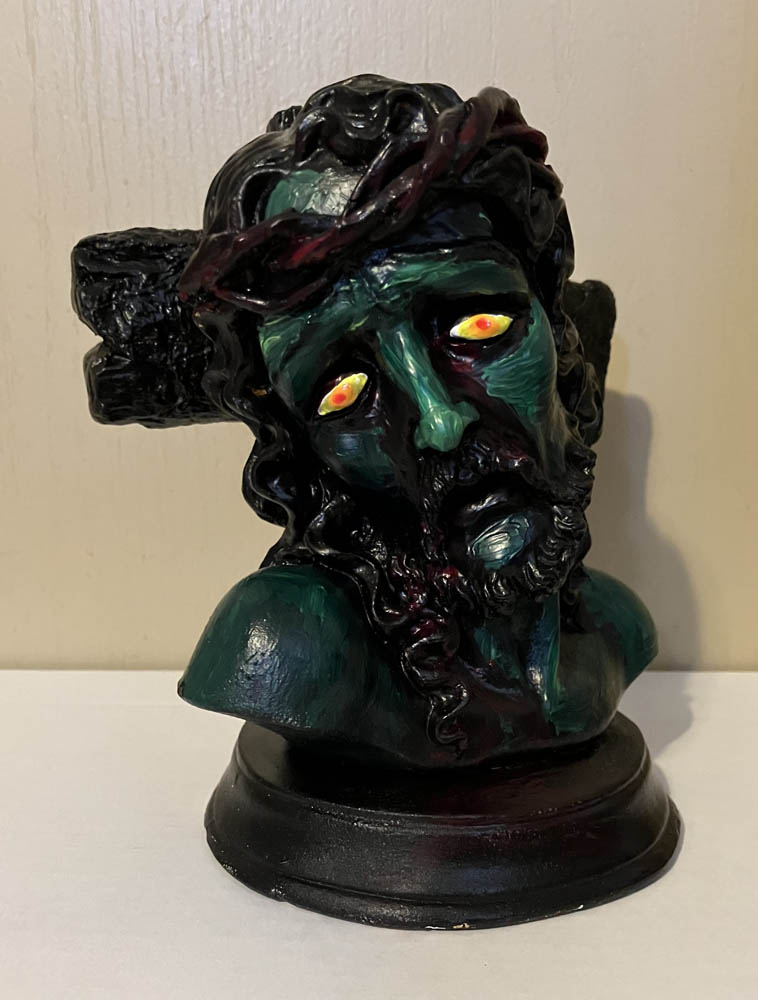





michael dowden
July 5, 2021 at 5:47 pm
Very well done..👌
Michael Dowden